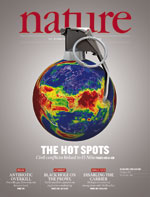历史学家和科学家早就在理论上认为,全球气候和全球暴力模式也许是联系在一起的,但这个观点从未被用数据直接验证过。

现在,一项新的研究分析了民间冲突是否与“厄尔尼诺-南方涛动”(ENSO)有关。后者是现代全球气候年际变化的主要形式。这项研究利用在1950年和2004年间收集的关于热带国家的数据发现,在“厄尔尼诺”年份爆发新的民间冲突的概率是在气温较低的“拉尼娜”年份的两倍。
总的来说,这些发现表明,ENSO可能在引发1950年以来所有民间冲突的其中21%中起了一定作用。这项研究是关于现代社会的稳定性与全球气候相关的首次证明。
本期封面图片所示为每年表面气温受“厄尔尼诺”影响而升高的月数,其中蓝色等于0,红色等于12。 热带的变暖是由在太平洋中产生、被地球转动束缚在赤道附近的一个大气“开尔文波”引起的。
生物探索推进英文论文摘要:
Civil conflicts are associated with the global climate
It has been proposed that changes in global climate have been responsible for episodes of widespread violence and even the collapse of civilizations. Yet previous studies have not shown that violence can be attributed to the global climate, only that random weather events might be correlated with conflict in some cases. Here we directly associate planetary-scale climate changes with global patterns of civil conflict by examining the dominant interannual mode of the modern climate the El Niño/Southern Oscillation (ENSO). Historians have argued that ENSO may have driven global patterns of civil conflict in the distant past, a hypothesis that we extend to the modern era and test quantitatively. Using data from 1950 to 2004, we show that the probability of new civil conflicts arising throughout the tropics doubles during El Niño years relative to La Niña years. This result, which indicates that ENSO may have had a role in 21% of all civil conflicts since 1950, is the first demonstration that the stability of modern societies relates strongly to the global climate.







